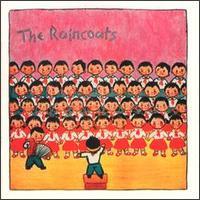A record that's been in and out of print in North America at various points during the past three decades, the Raincoats' self-titled debut is well worth the effort it takes to find a copy. This band is, simply put, the most forward-thinking act in rock since the Velvet Underground. Despite being an all-female band, they completely disregard any notions the listener might have of what that entails, preferring to cast off any stifling sense of identity and instead embody their music.
The music itself is some of the most deceptively complex ever made under the auspices of a punk scene. Opening track "No Side to Fall In" contrasts Vicky Aspinall's manic, screeching violin with call-and-response vocals that blend and overlap in an off-kilter harmony that turns into an expansive chant; the result is a shrill, nicely chaotic counterpoint to the oddly stilted but hypnotically swaying vocals, and the overall effect is one of liberating anarchy. This is a band that adopted nothing of the punk ethos but the absolute freedom it provide, and their ability to deftly navigate chaos and despair with a sense of adventure shows the extent to which the band enjoyed this freedom.
The entire album wreaks a particularly alluring, inviting brand of havoc. A stunningly strange cover of the Kinks' "Lola" destroys and then deepens even that song's gender confusion. "The Void"'s somber violin, jangly, rhythmic guitar and thudding vocals all intersect to create a majestic atonality that gradually builds until the refrain explodes into frantic drum rolls. Closing song "No Looking" translates a Jacques Prévert poem about a cruelly neglectful lover and singer Ana da Silva's restrained vocals build so gradually, as gradually as resentment, that the listener doesn't even realize their full impact until the rest of the band joins her in a shared lament at the song's end, in which they sing "no looking at me" so quickly and continuously that the words begin to run together until there's nothing but a cry of reserved anguish.
The Raincoats interweave triumph and freedom with frustration and isolation and the absolute insight and complexity found in their music and philosophy resonates even today as something that feels entirely new. This is a band that can't be captured in time or diluted by being placed into a context or a genre; their music is entirely their own, and I'd venture to say that no band has been as affecting or innovative since them.
